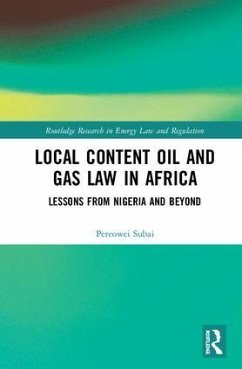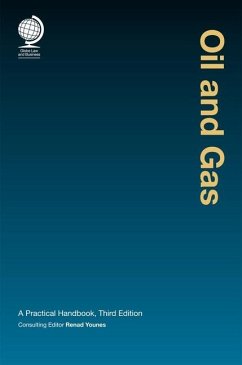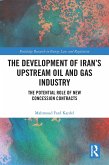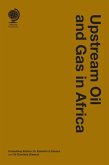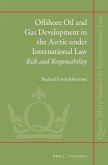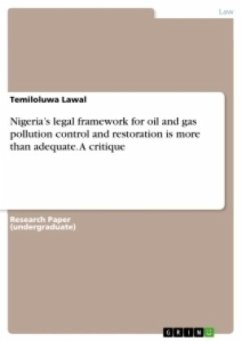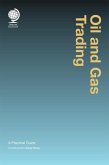- Gebundenes Buch
- Merkliste
- Auf die Merkliste
- Bewerten Bewerten
- Teilen
- Produkt teilen
- Produkterinnerung
- Produkterinnerung
Examining local content law and policy in the oil and gas industry, this book uses Nigeria as a primary case study, comparing its approach to countries such as Brazil and Norway which have also adopted local content laws in relation to their gas and oil industries.
Andere Kunden interessierten sich auch für
![Oil and Gas Oil and Gas]() Renad YounesOil and Gas283,99 €
Renad YounesOil and Gas283,99 €![The Development of Iran's Upstream Oil and Gas Industry The Development of Iran's Upstream Oil and Gas Industry]() Mahmoud Fard KardelThe Development of Iran's Upstream Oil and Gas Industry204,99 €
Mahmoud Fard KardelThe Development of Iran's Upstream Oil and Gas Industry204,99 €![Upstream Oil and Gas in Africa Upstream Oil and Gas in Africa]() Upstream Oil and Gas in Africa476,99 €
Upstream Oil and Gas in Africa476,99 €![Offshore Oil and Gas Development in the Arctic Under International Law Offshore Oil and Gas Development in the Arctic Under International Law]() Rachael Lorna JohnstoneOffshore Oil and Gas Development in the Arctic Under International Law244,99 €
Rachael Lorna JohnstoneOffshore Oil and Gas Development in the Arctic Under International Law244,99 €![Nigeria's legal framework for oil and gas pollution control and restoration is more than adequate. A critique Nigeria's legal framework for oil and gas pollution control and restoration is more than adequate. A critique]() Temiloluwa LawalNigeria's legal framework for oil and gas pollution control and restoration is more than adequate. A critique15,95 €
Temiloluwa LawalNigeria's legal framework for oil and gas pollution control and restoration is more than adequate. A critique15,95 €![Oil and Gas Trading: A Practical Guide Oil and Gas Trading: A Practical Guide]() Denys HickeyOil and Gas Trading: A Practical Guide278,99 €
Denys HickeyOil and Gas Trading: A Practical Guide278,99 €![Host Government Agreements and the Law in the Energy Sector Host Government Agreements and the Law in the Energy Sector]() Hakan SahinHost Government Agreements and the Law in the Energy Sector206,99 €
Hakan SahinHost Government Agreements and the Law in the Energy Sector206,99 €-
-
-
Examining local content law and policy in the oil and gas industry, this book uses Nigeria as a primary case study, comparing its approach to countries such as Brazil and Norway which have also adopted local content laws in relation to their gas and oil industries.
Hinweis: Dieser Artikel kann nur an eine deutsche Lieferadresse ausgeliefert werden.
Hinweis: Dieser Artikel kann nur an eine deutsche Lieferadresse ausgeliefert werden.
Produktdetails
- Produktdetails
- Verlag: Routledge
- Seitenzahl: 218
- Erscheinungstermin: 9. Januar 2019
- Englisch
- Abmessung: 240mm x 161mm x 16mm
- Gewicht: 496g
- ISBN-13: 9781138478619
- ISBN-10: 113847861X
- Artikelnr.: 55044874
- Herstellerkennzeichnung
- Libri GmbH
- Europaallee 1
- 36244 Bad Hersfeld
- gpsr@libri.de
- Verlag: Routledge
- Seitenzahl: 218
- Erscheinungstermin: 9. Januar 2019
- Englisch
- Abmessung: 240mm x 161mm x 16mm
- Gewicht: 496g
- ISBN-13: 9781138478619
- ISBN-10: 113847861X
- Artikelnr.: 55044874
- Herstellerkennzeichnung
- Libri GmbH
- Europaallee 1
- 36244 Bad Hersfeld
- gpsr@libri.de
Pereowei Subai is Senior Lecturer in Law at Niger Delta University, Bayelsa State, Nigeria.
CONTENTS
TABLE OF CASES
TABLE OF STATUTES AND INSTRUMENTS
TABLE OF ABBREVIATIONS
Introduction
1: Local Content in Petroleum Producing Countries: Strategies, Approaches,
and Impact
Abstract
1.1 Background to the rise of local content requirements in petroleum
producing countries
1.2 Perceived benefits of local content
1.3 Approaches to local content development
1.3.1 The protectionist approach
1.3.2 The liberalised approach to local content
1.4 Between protectionism and the liberalised approach
1.5 Some arguments against protectionist local content approaches
1.6 Conclusion
Bibliography
2: Legal and Institutional frameworks for local content development
Abstract
2.1 Legal frameworks and strategies
2.1.1 Institutional frameworks for local content regulation and development
2.2 Experiences of some selected countries
2.2.1 Brazil
2.2.2 Norway
2.3 Conclusion
Bibliography
3: an overview of the historical DEVELOPMENT OF LOCAL CONTENT IN THE
NIGERIAN PETROLEUM INDSUTRY
3.1 A review of historical development of local content in Nigeria's
petroleum industry
3.1.1 1956-1969: focus on employment of Nigerians
3.1.2 1969 1990: The Petroleum Act, DPR, NNPC
3.1.3 1990-2010 Discretionary awards of OPLs, Marginal Oil fields and the
birth of indigenous petroleum firms
3.2 Analysis of some factors responsible for the weak Nigerian content in
the petroleum industry pre-2010
3.3 Conclusion
Bibliography
4: an overview of the provisions of the nigerian oil and gs industry
content development act 2010
4.1 Introduction
4.2 The Nigerian Oil and Gas Industry Content Development Act (NOGICDA)
2010
4.2.1 Institutional framework for local content regulation and development
in Nigeria
4.2.2 Regulation and monitoring of the Nigerian Content: plans and reports
4.2.2.1 The Nigerian content plan
4.2.2.2 The Nigerian content performance report
4.3 Authorisations and certifications: the Nigerian Content Compliance
Certificate
4.4 Other salient local content provisions contained in NOGICDA
4.4.1 Contract awards
4.4.2 Employment and training
4.4.3 Technology transfer, research and development (R&D)
4.4.4 Requirements for the domiciliation of operations of multinationals
within Nigeria and utilization of Nigerian goods and services
4.4.5 Patronage of the Nigerian services sub sector
4.4.6 Information technology and local content: the e-marketplace and the
Joint Qualification System
4.4.7 Community local content
4.4.8 Other local content initiatives contained in NOGICDA
4.4.8.1 The Nigerian Content Consultative Forum
4.4.8.2 The Nigerian Content Development Fund
4.5 Conclusion
Bibliography
5 an analysis of The impact, necessity, and challenges of NOGICDA
5.1 Assessing the impact of NOGICDA
5.2 Is the legislative approach to local content necessary?
5.3 The legislative approach and the challenge weak capacity
5.3 Conclusion
Bibliography
6: AN ASSESSMENT OF THE FRAMEWORKS FOR THE ENFORCEMENT OF NOGICDA
6.1 Introduction
6.1 A review of the strategies employed by the NCDMB in the implementation
of NOGICDA
6.2 Private Nigerian citizens and the enforcement of the provisions of
NOGICDA
6.3 Conclusion
Bibliography
7 PROTECTIONIST LOCAL CONTENT MEASURES IN AFRICA and international trade
law
7.1 Introduction
7.2 International free trade law and LCRs
7.2.1 The international free trade regime
7.3 NOGICDA in the light of Nigeria's international free trade obligations
7.3.1 NOGICDA and the WTO system
7.4 Discussion and analysis
7.5 Conclusion
Bibliography
8 national oil companies and local content development
8.1 The rise and relevance of NOCs in the petroleum industry
8.2 Strategies employed by NOCs in furthering local content at home
8.3 NOCs and the acquisition and development of petroleum related
technology
8.4 Discussions, analysis and concluding remarks
Bibliography
9: Local content and Resource rich regions: a case study of NIGERIA'S niger
delta
9.1 Introduction
4.3 The Niger Delta struggle within the context of Nigeria's federalism
9.2 Derivation and the Niger Delta Economy since 1999
9.4 Conclusion
Bibliography
INDEX
TABLE OF CASES
TABLE OF STATUTES AND INSTRUMENTS
TABLE OF ABBREVIATIONS
Introduction
1: Local Content in Petroleum Producing Countries: Strategies, Approaches,
and Impact
Abstract
1.1 Background to the rise of local content requirements in petroleum
producing countries
1.2 Perceived benefits of local content
1.3 Approaches to local content development
1.3.1 The protectionist approach
1.3.2 The liberalised approach to local content
1.4 Between protectionism and the liberalised approach
1.5 Some arguments against protectionist local content approaches
1.6 Conclusion
Bibliography
2: Legal and Institutional frameworks for local content development
Abstract
2.1 Legal frameworks and strategies
2.1.1 Institutional frameworks for local content regulation and development
2.2 Experiences of some selected countries
2.2.1 Brazil
2.2.2 Norway
2.3 Conclusion
Bibliography
3: an overview of the historical DEVELOPMENT OF LOCAL CONTENT IN THE
NIGERIAN PETROLEUM INDSUTRY
3.1 A review of historical development of local content in Nigeria's
petroleum industry
3.1.1 1956-1969: focus on employment of Nigerians
3.1.2 1969 1990: The Petroleum Act, DPR, NNPC
3.1.3 1990-2010 Discretionary awards of OPLs, Marginal Oil fields and the
birth of indigenous petroleum firms
3.2 Analysis of some factors responsible for the weak Nigerian content in
the petroleum industry pre-2010
3.3 Conclusion
Bibliography
4: an overview of the provisions of the nigerian oil and gs industry
content development act 2010
4.1 Introduction
4.2 The Nigerian Oil and Gas Industry Content Development Act (NOGICDA)
2010
4.2.1 Institutional framework for local content regulation and development
in Nigeria
4.2.2 Regulation and monitoring of the Nigerian Content: plans and reports
4.2.2.1 The Nigerian content plan
4.2.2.2 The Nigerian content performance report
4.3 Authorisations and certifications: the Nigerian Content Compliance
Certificate
4.4 Other salient local content provisions contained in NOGICDA
4.4.1 Contract awards
4.4.2 Employment and training
4.4.3 Technology transfer, research and development (R&D)
4.4.4 Requirements for the domiciliation of operations of multinationals
within Nigeria and utilization of Nigerian goods and services
4.4.5 Patronage of the Nigerian services sub sector
4.4.6 Information technology and local content: the e-marketplace and the
Joint Qualification System
4.4.7 Community local content
4.4.8 Other local content initiatives contained in NOGICDA
4.4.8.1 The Nigerian Content Consultative Forum
4.4.8.2 The Nigerian Content Development Fund
4.5 Conclusion
Bibliography
5 an analysis of The impact, necessity, and challenges of NOGICDA
5.1 Assessing the impact of NOGICDA
5.2 Is the legislative approach to local content necessary?
5.3 The legislative approach and the challenge weak capacity
5.3 Conclusion
Bibliography
6: AN ASSESSMENT OF THE FRAMEWORKS FOR THE ENFORCEMENT OF NOGICDA
6.1 Introduction
6.1 A review of the strategies employed by the NCDMB in the implementation
of NOGICDA
6.2 Private Nigerian citizens and the enforcement of the provisions of
NOGICDA
6.3 Conclusion
Bibliography
7 PROTECTIONIST LOCAL CONTENT MEASURES IN AFRICA and international trade
law
7.1 Introduction
7.2 International free trade law and LCRs
7.2.1 The international free trade regime
7.3 NOGICDA in the light of Nigeria's international free trade obligations
7.3.1 NOGICDA and the WTO system
7.4 Discussion and analysis
7.5 Conclusion
Bibliography
8 national oil companies and local content development
8.1 The rise and relevance of NOCs in the petroleum industry
8.2 Strategies employed by NOCs in furthering local content at home
8.3 NOCs and the acquisition and development of petroleum related
technology
8.4 Discussions, analysis and concluding remarks
Bibliography
9: Local content and Resource rich regions: a case study of NIGERIA'S niger
delta
9.1 Introduction
4.3 The Niger Delta struggle within the context of Nigeria's federalism
9.2 Derivation and the Niger Delta Economy since 1999
9.4 Conclusion
Bibliography
INDEX
CONTENTS
TABLE OF CASES
TABLE OF STATUTES AND INSTRUMENTS
TABLE OF ABBREVIATIONS
Introduction
1: Local Content in Petroleum Producing Countries: Strategies, Approaches,
and Impact
Abstract
1.1 Background to the rise of local content requirements in petroleum
producing countries
1.2 Perceived benefits of local content
1.3 Approaches to local content development
1.3.1 The protectionist approach
1.3.2 The liberalised approach to local content
1.4 Between protectionism and the liberalised approach
1.5 Some arguments against protectionist local content approaches
1.6 Conclusion
Bibliography
2: Legal and Institutional frameworks for local content development
Abstract
2.1 Legal frameworks and strategies
2.1.1 Institutional frameworks for local content regulation and development
2.2 Experiences of some selected countries
2.2.1 Brazil
2.2.2 Norway
2.3 Conclusion
Bibliography
3: an overview of the historical DEVELOPMENT OF LOCAL CONTENT IN THE
NIGERIAN PETROLEUM INDSUTRY
3.1 A review of historical development of local content in Nigeria's
petroleum industry
3.1.1 1956-1969: focus on employment of Nigerians
3.1.2 1969 1990: The Petroleum Act, DPR, NNPC
3.1.3 1990-2010 Discretionary awards of OPLs, Marginal Oil fields and the
birth of indigenous petroleum firms
3.2 Analysis of some factors responsible for the weak Nigerian content in
the petroleum industry pre-2010
3.3 Conclusion
Bibliography
4: an overview of the provisions of the nigerian oil and gs industry
content development act 2010
4.1 Introduction
4.2 The Nigerian Oil and Gas Industry Content Development Act (NOGICDA)
2010
4.2.1 Institutional framework for local content regulation and development
in Nigeria
4.2.2 Regulation and monitoring of the Nigerian Content: plans and reports
4.2.2.1 The Nigerian content plan
4.2.2.2 The Nigerian content performance report
4.3 Authorisations and certifications: the Nigerian Content Compliance
Certificate
4.4 Other salient local content provisions contained in NOGICDA
4.4.1 Contract awards
4.4.2 Employment and training
4.4.3 Technology transfer, research and development (R&D)
4.4.4 Requirements for the domiciliation of operations of multinationals
within Nigeria and utilization of Nigerian goods and services
4.4.5 Patronage of the Nigerian services sub sector
4.4.6 Information technology and local content: the e-marketplace and the
Joint Qualification System
4.4.7 Community local content
4.4.8 Other local content initiatives contained in NOGICDA
4.4.8.1 The Nigerian Content Consultative Forum
4.4.8.2 The Nigerian Content Development Fund
4.5 Conclusion
Bibliography
5 an analysis of The impact, necessity, and challenges of NOGICDA
5.1 Assessing the impact of NOGICDA
5.2 Is the legislative approach to local content necessary?
5.3 The legislative approach and the challenge weak capacity
5.3 Conclusion
Bibliography
6: AN ASSESSMENT OF THE FRAMEWORKS FOR THE ENFORCEMENT OF NOGICDA
6.1 Introduction
6.1 A review of the strategies employed by the NCDMB in the implementation
of NOGICDA
6.2 Private Nigerian citizens and the enforcement of the provisions of
NOGICDA
6.3 Conclusion
Bibliography
7 PROTECTIONIST LOCAL CONTENT MEASURES IN AFRICA and international trade
law
7.1 Introduction
7.2 International free trade law and LCRs
7.2.1 The international free trade regime
7.3 NOGICDA in the light of Nigeria's international free trade obligations
7.3.1 NOGICDA and the WTO system
7.4 Discussion and analysis
7.5 Conclusion
Bibliography
8 national oil companies and local content development
8.1 The rise and relevance of NOCs in the petroleum industry
8.2 Strategies employed by NOCs in furthering local content at home
8.3 NOCs and the acquisition and development of petroleum related
technology
8.4 Discussions, analysis and concluding remarks
Bibliography
9: Local content and Resource rich regions: a case study of NIGERIA'S niger
delta
9.1 Introduction
4.3 The Niger Delta struggle within the context of Nigeria's federalism
9.2 Derivation and the Niger Delta Economy since 1999
9.4 Conclusion
Bibliography
INDEX
TABLE OF CASES
TABLE OF STATUTES AND INSTRUMENTS
TABLE OF ABBREVIATIONS
Introduction
1: Local Content in Petroleum Producing Countries: Strategies, Approaches,
and Impact
Abstract
1.1 Background to the rise of local content requirements in petroleum
producing countries
1.2 Perceived benefits of local content
1.3 Approaches to local content development
1.3.1 The protectionist approach
1.3.2 The liberalised approach to local content
1.4 Between protectionism and the liberalised approach
1.5 Some arguments against protectionist local content approaches
1.6 Conclusion
Bibliography
2: Legal and Institutional frameworks for local content development
Abstract
2.1 Legal frameworks and strategies
2.1.1 Institutional frameworks for local content regulation and development
2.2 Experiences of some selected countries
2.2.1 Brazil
2.2.2 Norway
2.3 Conclusion
Bibliography
3: an overview of the historical DEVELOPMENT OF LOCAL CONTENT IN THE
NIGERIAN PETROLEUM INDSUTRY
3.1 A review of historical development of local content in Nigeria's
petroleum industry
3.1.1 1956-1969: focus on employment of Nigerians
3.1.2 1969 1990: The Petroleum Act, DPR, NNPC
3.1.3 1990-2010 Discretionary awards of OPLs, Marginal Oil fields and the
birth of indigenous petroleum firms
3.2 Analysis of some factors responsible for the weak Nigerian content in
the petroleum industry pre-2010
3.3 Conclusion
Bibliography
4: an overview of the provisions of the nigerian oil and gs industry
content development act 2010
4.1 Introduction
4.2 The Nigerian Oil and Gas Industry Content Development Act (NOGICDA)
2010
4.2.1 Institutional framework for local content regulation and development
in Nigeria
4.2.2 Regulation and monitoring of the Nigerian Content: plans and reports
4.2.2.1 The Nigerian content plan
4.2.2.2 The Nigerian content performance report
4.3 Authorisations and certifications: the Nigerian Content Compliance
Certificate
4.4 Other salient local content provisions contained in NOGICDA
4.4.1 Contract awards
4.4.2 Employment and training
4.4.3 Technology transfer, research and development (R&D)
4.4.4 Requirements for the domiciliation of operations of multinationals
within Nigeria and utilization of Nigerian goods and services
4.4.5 Patronage of the Nigerian services sub sector
4.4.6 Information technology and local content: the e-marketplace and the
Joint Qualification System
4.4.7 Community local content
4.4.8 Other local content initiatives contained in NOGICDA
4.4.8.1 The Nigerian Content Consultative Forum
4.4.8.2 The Nigerian Content Development Fund
4.5 Conclusion
Bibliography
5 an analysis of The impact, necessity, and challenges of NOGICDA
5.1 Assessing the impact of NOGICDA
5.2 Is the legislative approach to local content necessary?
5.3 The legislative approach and the challenge weak capacity
5.3 Conclusion
Bibliography
6: AN ASSESSMENT OF THE FRAMEWORKS FOR THE ENFORCEMENT OF NOGICDA
6.1 Introduction
6.1 A review of the strategies employed by the NCDMB in the implementation
of NOGICDA
6.2 Private Nigerian citizens and the enforcement of the provisions of
NOGICDA
6.3 Conclusion
Bibliography
7 PROTECTIONIST LOCAL CONTENT MEASURES IN AFRICA and international trade
law
7.1 Introduction
7.2 International free trade law and LCRs
7.2.1 The international free trade regime
7.3 NOGICDA in the light of Nigeria's international free trade obligations
7.3.1 NOGICDA and the WTO system
7.4 Discussion and analysis
7.5 Conclusion
Bibliography
8 national oil companies and local content development
8.1 The rise and relevance of NOCs in the petroleum industry
8.2 Strategies employed by NOCs in furthering local content at home
8.3 NOCs and the acquisition and development of petroleum related
technology
8.4 Discussions, analysis and concluding remarks
Bibliography
9: Local content and Resource rich regions: a case study of NIGERIA'S niger
delta
9.1 Introduction
4.3 The Niger Delta struggle within the context of Nigeria's federalism
9.2 Derivation and the Niger Delta Economy since 1999
9.4 Conclusion
Bibliography
INDEX

